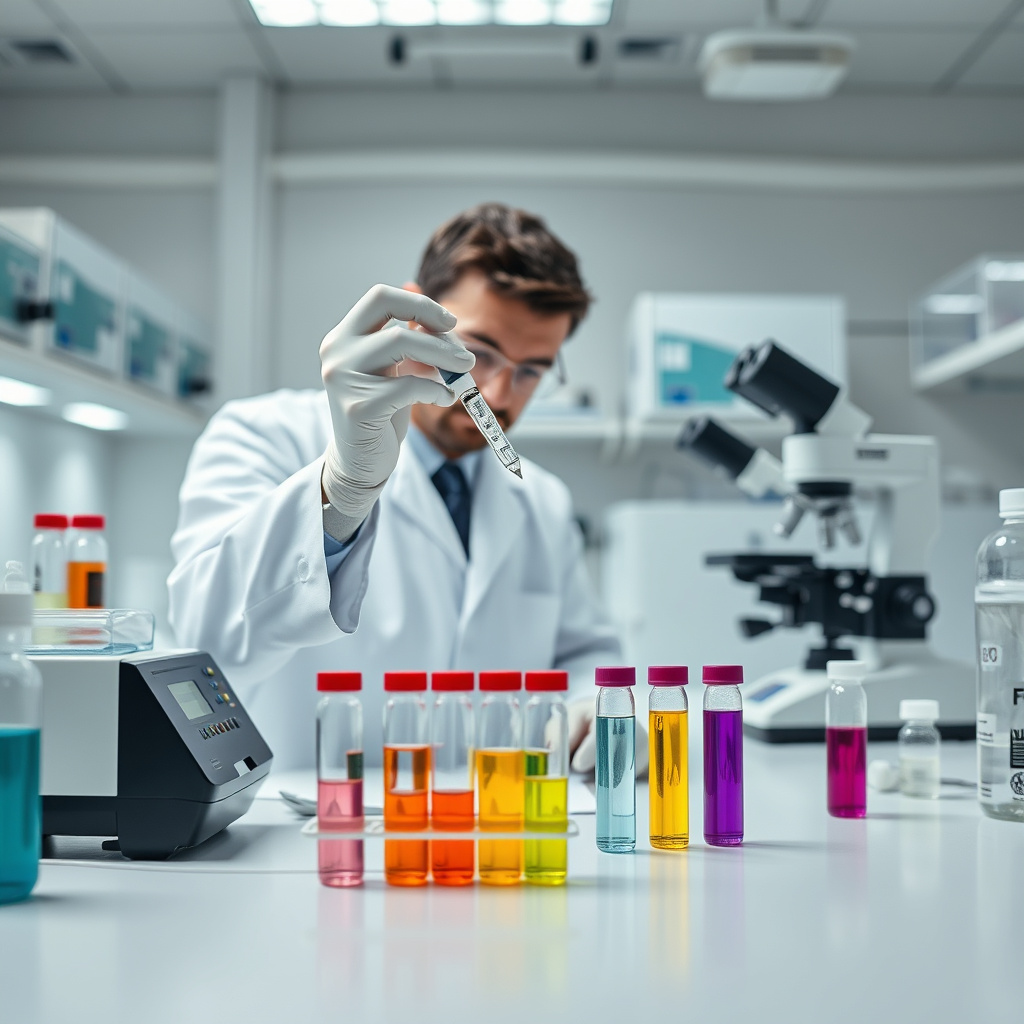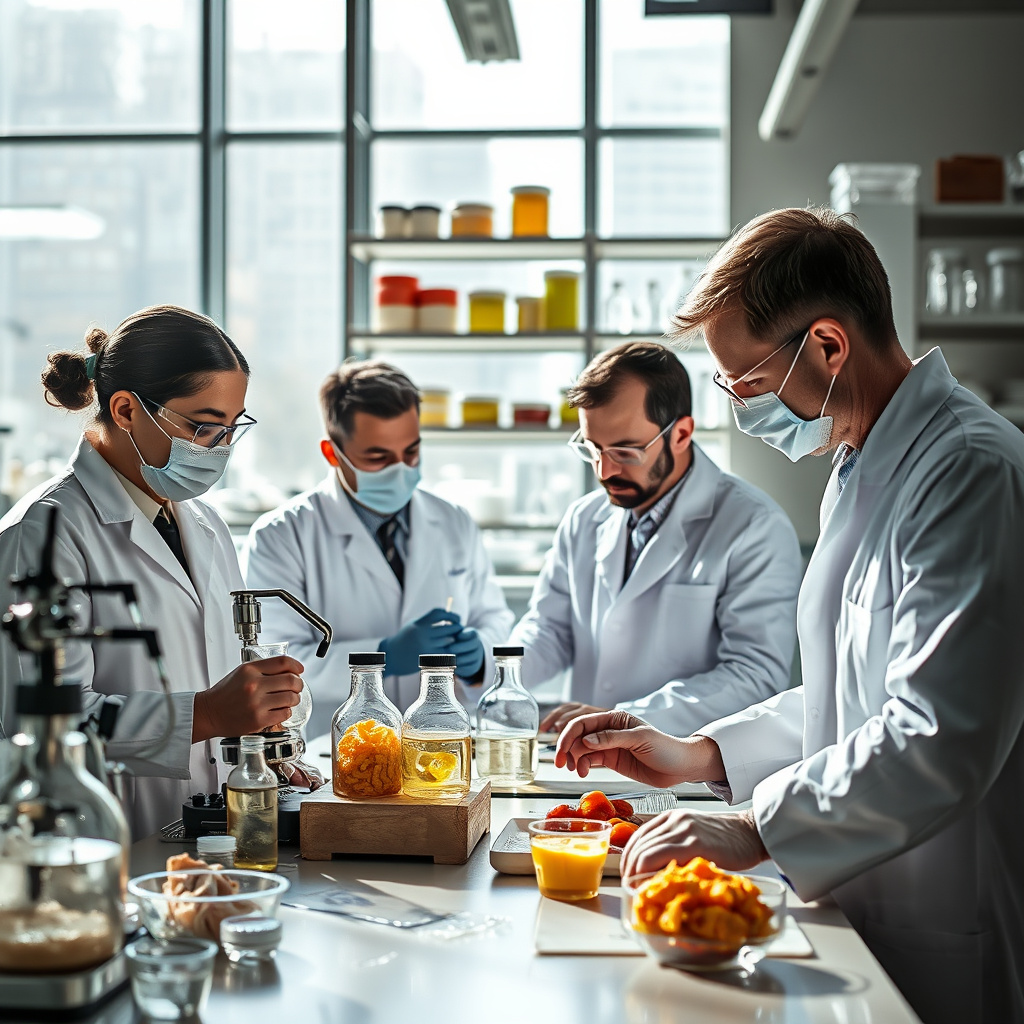How glycerin can be used in vaccine production is essential for enhancing vaccine stability and efficacy, acting as a preservative and stabilizer.
Have you ever wondered how glycerin plays a vital role in vaccine production?
In this post, we will delve into the fascinating ways glycerin is utilized to enhance vaccine stability and effectiveness.
By the end of this article, you’ll gain insights into its importance, making you better equipped to understand its role in modern medicine.
The Role of Glycerin in Vaccine Formulation
In the ever-evolving field of vaccine development, the importance of excipients, or inactive ingredients, cannot be overstated. Among these, glycerin plays a vital role in ensuring the efficacy and stability of vaccines. Understanding how glycerin functions in vaccine formulation is essential for both manufacturers and consumers in the healthcare landscape.
What is Glycerin?
Glycerin, also known as glycerol, is a colorless, odorless liquid that is sweet-tasting and non-toxic. It is derived from both natural and synthetic sources, making it a versatile ingredient for various applications. In the context of vaccines, glycerin is primarily used for its properties as a humectant, solvent, and stabilizer. This multifunctionality helps enhance the overall performance of the vaccine.
Functions of Glycerin in Vaccines
When incorporated into vaccine formulations, glycerin serves several crucial functions:
- Stabilization: Glycerin helps maintain the stability of the active ingredients within vaccines, preventing degradation and ensuring that the vaccine remains effective over time.
- Preservation: As a humectant, glycerin attracts moisture, which can help maintain the integrity of the vaccine and extend its shelf life.
- Solvent Properties: Glycerin acts as a solvent for various components, facilitating the even distribution of active ingredients throughout the formulation.
Glycerin Sourcing for Vaccine Production
For vaccine manufacturers looking to incorporate glycerin into their formulations, sourcing high-quality glycerin is paramount. Many choose to partner with a reliable glycerin supplier to ensure the purity and consistency of the product. Whether one is seeking to buy glycerin in bulk or looking for competitive glycerin wholesale prices, establishing a strong relationship with a reputable supplier is essential for successful vaccine production.
Types of Glycerin for Vaccines
Not all glycerin is created equal. Vaccines typically require pharmaceutical-grade glycerin, often referred to as glicerina farmacêutica. This high-purity glycerin is essential for ensuring safety and efficacy in vaccine formulations. Manufacturers must be diligent in choosing the right type of glycerin, as using lower-quality products can compromise vaccine effectiveness.
Conclusion
As the healthcare industry continues to innovate and adapt, the role of glycerin in vaccine formulation remains critical. Its unique properties not only help in stabilization and preservation but also ensure that vaccines can be distributed and administered effectively. In this context, the demand for reliable glycerin suppliers and manufacturers has never been higher, underscoring the importance of quality and consistency in vaccine production.
Innovations in Vaccine Development Using Glycerin
As the world continues to face various health challenges, the quest for effective vaccines remains a priority. One promising avenue involves exploring the role of glycerin in vaccine development. The inclusion of glycerin in vaccine formulations enhances stability, protects active ingredients, and improves overall effectiveness. This multifaceted compound, derived from natural sources, has garnered attention not only for its safety but also for its versatility in different applications.
The Importance of Glycerin in Vaccine Stability
Glycerin’s ability to act as a stabilizer is particularly crucial in the formulation of vaccines. By maintaining the integrity of the active ingredients, it ensures that vaccines remain effective over time. This is vital when considering the distribution of vaccines, especially in areas where storage conditions may not be ideal. With glycerin, manufacturers can produce vaccines that withstand temperature fluctuations, making them more resilient during transportation and storage.
- Enhanced Shelf Life: Glycerin helps in prolonging the shelf life of vaccines, allowing for wider distribution without compromising their efficacy.
- Protection Against Degradation: It acts as a protective agent against degradation caused by environmental factors.
Glycerin’s Role in Immune Response
Research has shown that glycerin can play a part in modulating the immune response. By acting as a humectant, it helps maintain moisture in the vaccine formulation, which can enhance the delivery of antigens to the immune system. This can lead to a more robust immune response, potentially improving vaccine effectiveness. For those involved in vaccine development, understanding how to harness glycerin’s properties can be a game-changer.
Sourcing Quality Glycerin for Vaccine Production
For vaccine manufacturers, sourcing high-quality glycerin is essential. Partnering with reputable glycerin suppliers ensures that the glycerin used is of pharmaceutical grade. This is important not only for the safety of the vaccine but also for compliance with regulatory standards. Companies looking to buy glycerin in bulk should focus on suppliers known for their reliability and quality.
- Vegetable Glycerin Supplier: Many manufacturers prefer vegetable glycerin due to its natural origin and safety profile.
- Glycerin Wholesale Prices: Bulk purchasing can lead to cost savings, making it a viable option for large-scale production.
As the landscape of vaccine development evolves, leveraging the benefits of glycerin can lead to significant advancements. By understanding how this compound can improve formulation stability and immune response, developers can create more effective vaccines. The future of public health may very well hinge on innovations like these, making glycerin an indispensable component in the fight against diseases.
Choosing the Right Glycerin Supplier for Vaccine Production
In the intricate world of vaccine production, selecting the right glycerin supplier is crucial. Glycerin plays a vital role in ensuring the stability and efficacy of vaccines. Understanding how to choose a supplier who meets your specific needs can significantly impact the quality of your products.
Understanding Your Requirements
Before diving into the search for a glycerin supplier, it’s essential to identify your specific requirements. Are you looking for a glycerin manufacturer that specializes in pharmaceutical-grade glycerin? Or perhaps you need a supplier that can provide glycerin in bulk for large-scale production? Knowing your needs will help narrow down potential suppliers and streamline the selection process.
Evaluating Supplier Credentials
Once you have a clear idea of your requirements, the next step is to evaluate the credentials of potential suppliers. Look for suppliers with a proven track record in the vaccine production industry. Certifications and compliance with regulatory standards are important indicators of a reliable supplier. For instance, a reputable food grade glycerin supplier should adhere to stringent quality control measures, ensuring that their products meet industry standards.
Quality Assurance and Testing
Quality assurance is paramount when it comes to vaccine production. Engage with suppliers who conduct rigorous testing of their glycerin products. This includes testing for purity, consistency, and potential contaminants. Suppliers should be able to provide documentation and reports that verify their quality assurance processes. A supplier that prioritizes quality will help ensure that your vaccine formulations remain effective and safe.
Pricing and Supply Chain Reliability
Cost is always a consideration, but it should not be the sole factor in your decision. Investigate the glycerin wholesale prices offered by potential suppliers and compare them with others in the industry. However, keep in mind that the cheapest option may not always be the best. Reliability in the supply chain is equally important; ensure that the supplier can meet your demand consistently, especially during peak production periods.
Customer Support and Responsiveness
Effective communication is key when working with a supplier. Choose a glycerin supplier who offers robust customer support and is responsive to your inquiries. The ability to quickly address issues or provide additional information can make a significant difference in your production timeline. A supplier that values customer relationships is often more committed to ensuring your satisfaction.
Exploring Local Suppliers
In the quest for a reliable supplier, consider exploring glycerin suppliers near me. Local suppliers can offer several advantages, including quicker delivery times and lower shipping costs. Engaging with local suppliers can also foster stronger relationships, making it easier to communicate and resolve any potential issues that may arise.
In the present landscape of vaccine production, the choice of a glycerin supplier can have far-reaching implications. By carefully considering your needs, evaluating supplier credentials, and prioritizing quality and reliability, you can make an informed decision that supports your vaccine production goals effectively.
Environmental and Safety Considerations for Glycerin in Vaccines
Understanding the Importance of Safety
When it comes to vaccine production, the safety of all ingredients is paramount. Glycerin, a versatile compound often found in medicinal formulations, plays a crucial role in ensuring vaccines are both effective and safe for human use. As we explore glycerin’s pharmaceutical applications, it’s essential to consider the environmental and safety implications associated with its use.
Environmental Impact of Glycerin Production
The sourcing and production of glycerin can have varying environmental impacts, depending on the methods used. Sustainable practices in glycerin manufacturing can significantly reduce the carbon footprint associated with vaccine production. Many suppliers are now focusing on eco-friendly processes that minimize waste and energy consumption. It’s vital for vaccine developers to select a glycerin supplier that prioritizes sustainable sourcing and production techniques.
- Renewable Resources: Many glycerin manufacturers are turning to vegetable sources, making the production process more sustainable.
- Waste Management: Implementing effective waste management strategies during glycerin production can greatly lessen environmental harm.
- Energy Efficiency: Utilizing energy-efficient technologies not only reduces costs but also lessens the environmental impact.
Safety Protocols in Vaccine Formulation
The safety of glycerin in vaccines is not just about sourcing; it’s also about adhering to stringent safety protocols during formulation. Ensuring that glycerin meets the highest standards is essential for maintaining the integrity of vaccines. Vaccine developers must work closely with their glycerin suppliers to ensure that all products are of the highest quality and free from contaminants.
Quality Assurance and Testing
Regular testing and quality assurance protocols are vital in the vaccine industry. This includes rigorous testing of glycerin to ensure it meets pharmaceutical standards. It is crucial to partner with a food grade glycerin supplier who can provide documentation and certifications that demonstrate compliance with safety regulations. Transparency in sourcing and production processes strengthens trust and accountability within the pharmaceutical industry.
Choosing the Right Glycerin Supplier
Selecting the right supplier for glycerin is a critical decision for vaccine producers. It goes beyond just finding a glycerin manufacturer with competitive prices. Factors to consider include:
- Reputation: Look for suppliers with a proven track record in the industry.
- Certifications: Ensure they meet all regulatory requirements for pharmaceutical-grade products.
- Location: Finding glycerin suppliers near me can also reduce transportation emissions and costs.
By focusing on these aspects, vaccine developers can ensure they are using glycerin that is not only effective but also environmentally responsible and safe for public use.
Future Perspectives: Glycerin’s Evolving Role in Biopharmaceuticals
As the biopharmaceutical landscape continues to evolve, the significance of Glicerina Farmacêutica in vaccine formulation is becoming increasingly apparent. This versatile compound is not only a key ingredient in the development of vaccines but is also paving the way for innovative approaches in biopharmaceutical production. In the present scenario, the ability of glycerin to act as a stabilizer and preservative helps maintain the efficacy of vaccines, ensuring that they remain effective throughout their shelf life.
The Innovative Path Ahead
Current advancements in vaccine technology highlight glycerin’s role in enhancing the stability of active ingredients. For instance, glycerin can improve the solubility of proteins and peptides, which are crucial for many modern vaccines. As researchers explore new formulations, the use of glycerin is expanding beyond traditional applications. It is now being used in combination with other excipients to create novel delivery systems that can enhance immune responses. This innovative use not only improves vaccine performance but also opens new avenues for the development of therapeutics that could benefit from glycerin’s unique properties.
Choosing the Right Partner
When it comes to sourcing Glicerina Farmacêutica, selecting a reliable glycerin supplier is fundamental. The quality of glycerin can significantly impact the final product, making it imperative to collaborate with established glycerin manufacturers who adhere to stringent quality standards. Whether you are looking to buy glycerin in bulk or seeking glycerin wholesale prices, ensuring that your supplier meets pharmaceutical-grade requirements is essential for maintaining safety and effectiveness in vaccine production.
Environmental Considerations
In the current industry climate, the environmental impact of ingredients used in pharmaceuticals is under close scrutiny. Glycerin, particularly when sourced from sustainable practices, offers a greener alternative compared to synthetic alternatives. Many industrial glycerin suppliers are now focusing on eco-friendly sourcing methods, which not only help in reducing the carbon footprint but also align with the growing demand for sustainable biopharmaceutical practices. As this trend continues, the role of glycerin in vaccines will likely expand, reflecting a commitment to environmental stewardship while maintaining high efficacy in vaccine development.
By embracing these advancements and focusing on quality sourcing, the biopharmaceutical industry is well-positioned to harness the full potential of Glicerina Farmacêutica. This evolution signifies not just a change in formulation practices, but a holistic approach to producing safer and more effective vaccines for the global population.






